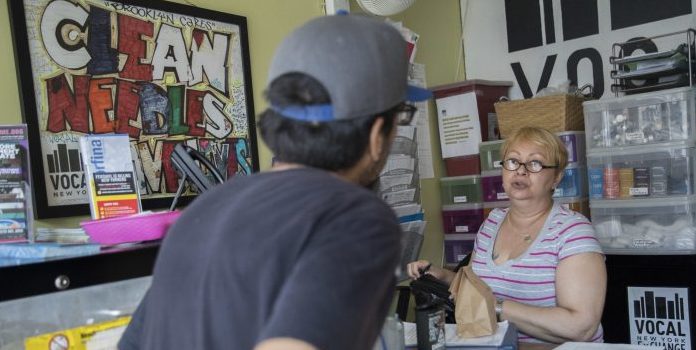(Headline USA) An officially-authorized, state-sanctioned capitulation to criminal-loving leftists has dropped in New York City, where safe havens for people to use heroin and other narcotics have been cleared to open in hopes of curbing deadly overdoses, the mayor and health commissioner said.
The “overdose prevention centers” — commonly known as supervised injection sites or safer consumption spaces, or not so commonly known as curbside crime cubicles — have been discussed for years in New York and some other U.S. cities and states. They already exist in Canada, Australia and Europe.
A few unofficial facilities have operated in the city for some time, allowing drug users a monitored place to partake.
Proponents say the facilities save lives by recognizing the reality of drug use and providing a place where users are watched for signs of overdoses, which claimed a record number of lives in the city and nation last year.
“I’m proud to show cities in this country that after decades of failure, a smarter approach is possible,” Mayor Bill de Blasio, a Democrat, said in a statement.
Opponents, however, see the sites as moral failures that essentially sanction people harming themselves and create hubs of drug use. Further, federal law bans operating a place for taking illegal drugs, and the government successfully sued in recent years to block a supervised consumption space in Philadelphia.
A more rational way to fight the overdose epidemic, some argue, would be to stem the flood of illegal drug smuggling pouring into the country under President Joe Biden’s open borders policy.
The U.S. Justice Department declined to comment on New York City’s plan, which is placing supervised injection sites at existing syringe exchange programs. City Health Commissioner Dr. Dave Chokshi said they were open as of Tuesday.
Supervised injection sites don’t sell drugs — at least not yet, for now users bring their own — but have monitors who watch for signs of overdose and can administer an antidote if needed. Sterile syringes and other accoutrements are usually on hand. Chokshi suggested the facilities also would offer people referrals to drug treatment and other services.
The U.S. has been contending for years with a boom in opioid use and deaths, fueled at first by increased prescribing in the 1990s and then by users turning to heroin and illicit fentanyl. Nearly 500,000 people nationwide died of opioid overdoses from 1999-2019, according to the federal Centers for Disease Control and Prevention, and the epidemic only worsened last year.
The CDC estimates there were more than 93,300 overdose deaths in 2020, up nearly 30% from the prior year’s number. In New York City, more than 2,060 people died of overdoses last year, the most since reporting began in 2000.
Looking at such statistics, cities from San Francisco to the college town of Ithaca, New York, have sought to open supervised injection sites. In July, Rhode Island became the first state to authorize them.
At the same time, some communities in the Seattle area and elsewhere have moved to ban them or discussed doing so.
Researchers have estimated that New York’s City’s proposal could prevent 130 deaths and save $7 million in health care expenses per year. Apparently, no research has been done to determine how much it could cost the city and its residents in terms of increased crime from addicts stealing for their next fix.
But city special narcotics prosecutor Bridget Brennan has expressed reservations, saying the facilities could risk legal problems, neighborhood tension and giving a misimpression that drug use is safe.
The U.S. Supreme Court declined last month to take up a Philadelphia group’s fight to open a safe injection site, which a divided federal appeals court had rejected. Federal prosecutors in Philadelphia had sued to stop it, citing a 1980s law that was aimed at shuttering locations where people used crack cocaine.
De Blasio, who is term-limited and leaving office next month, first asked the state for permission to authorize such sites in 2018. At the time, city officials said they would need approval from the state Health Department and the district attorneys in the areas of the sites, among other officials.
Adapted from reporting by the Associated Press

